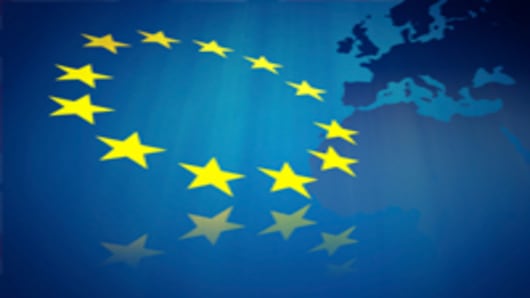The European Cental Bank's bailout package is just a $1 trillion fig leaf covering the problem and a better move would have been to arrange for Greece and Portugal to leave the European Union, Kenneth Rogoff, professor of economics and public policy at Harvard, told CNBC Friday.
“It’s a fig leaf for the ECB to go across Europe and bailout countries. The Germans know that they’re going to end up paying more than the other countries,” Rogoff said.
“There’s a little flavor of California bailing out Arizona, here,” he said.
"“The German people were in shock Monday morning (after the bailout)."
But "a weak euro isn’t necessarily bad. In fact, it’s great for Germany," he added.
On Thursday, White House Economic Advisor Paul Volcker, a former Federal Reserve chairman, said that it was difficult to have a common currency without a common government.
“It’s a typical aftershock to have sovereign debt crises after banking crises. But Europe is extraordinary,” Rogoff said. “There’s all these political variables. I’d be shocked if they didn’t have sovereign debt crises.”
“It was nuts to let Greece and Portugal in (to the EU) as quickly as they did,” he added. “They just looked the other way and decided to let them in. Greece had high inflation, default risks. Portugal had an IMF program early as 1984."
- Watch Kenneth Rogoff interviewed on CNBC above.
"I think they should have let Portugal and Greece go" before doing the bailout -- not overnight -- but in an orderly fashion, Rogoff said.
The European Commission indicated that their expansionist plans will likely continue earlier this week.
Estonia, a country of 1.3 million people, is on course to adopt the euro in January 2011, subject to the approval of all 27 EU member states, 16 of which are in the euro zone.
Estonia's sovereign debt was at 7.2 percent of GDP in 2009, well below the euro-zone average of 60 percent.
“Estonia is next? It’s doing great, but, it’s not in anyone’s interest to expand this so fast,” Rogoff said.
Rogoff argued that a weaker euro might boost the economy of the Eurozone due to export growth, but would similarly hurt America, which faces increased competition.
“We compete with Europe on a lot of fronts," he said. "On some measures, they’re our biggest export destination."



